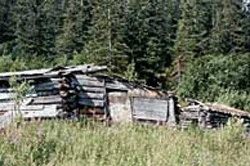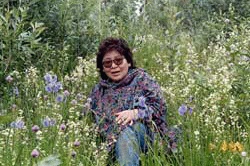|
This is my first attempt to tell about how we lived in Kotzebue in the 1950s before snowmachines. I tell about how I noticed our house was different from my Oomah's (girlfriend's) house. I also want to tell about the difficulty in getting the logs to houses in Kotzebue. We had to go up to Kobuk Lake from Kotzebue to cut down the logs during the spring and raft them down to the ocean (Kotzebue) during the summer. It was easier for my mother's people to get logs in Kiana on the Kobuk River where their village is surrounded by trees.
* * *
 |
| Schaeffer Cabin |
 |
Our house was cold the winter morning I woke, as Dad was putting driftwood into the wood stove he made from a fifty-five gallon drum. During the cold winter mornings the oil cook stove didn't put out enough heat to warm our single room log cabin.
"Ahvooruk," Dad said," wear your tootooliks to school today. It's snowing outside."
"Did you turn them inside out to dry yesterday?" asked Mom.
I assured her that I had dried my mukluks properly and hung them next to my muskrat lined parkie. As I cuddled under my goose down blanket, I wondered why our house was different from my Oomah's (a same age female friend's) house. Her house had a colorful linoleum floor and chalky white walls. But our wooden floor had a drab gray color, and the walls were partially covered with plywood. The exposed exterior wall had coarse tundra moss that was tightly squeezed between large uneven rustic gray logs. I couldn't wait to see what our house truly looked like from the outside.
"Don't pet Nanook today," Dad said between big gulps of coffee. "The darn dog he chewed off the oogruk rawhide line from my harpoon. He got a good scolding."
Poor dog, I thought. Last summer we chased butterflies and goslings while Mom picked wild rhubarb to preserve in wooden barrels for the winter. The barrels were kept in a clean underground storage cache.
Outside, heavy snow had formed odd shapes on the frozen clothes that hung on the clothesline near the cache. Dad had turned his basket sled upside down, and was carefully chipping the ice off the steel runners.
"School will start pretty soon, your Mom will need help with your brother later," Dad reminded me.
 |
| Margaret Schaeffer |
 |
My curiosity was driven even further after observing the pictures in our reading book, Dick and Jane. They had a room for everyone in their house. Outside, there were piles and piles of dead leaves they later put into bags. I wondered how their mom preserved those leaves. Their grass was too short, nowhere for the summer birds to hide and lay their eggs. If they had to wear mukluks, how would they gather dry grass to insulate them?
On my way home from school I noticed that the sun was already setting, its reflection was beautiful on the clear ocean ice. All the neighborhood dogs were quiet, tired from the previous day's long journey from caribou island. My soft-bottom mukluks didn't make a sound on the snow as I skipped along the pure white trail.
Mom was busy making Dad a waterproof hunting bag. She used three types of seal hide and beluga whale sinew to sew. I loved to hear the sound of the sinew as she pulled the needle through the thick hide. I can still hear the rhythm.
"What are you thinking so hard about, Ahvooruk," Mom inquired.
"Our house," I replied.
"I like this house," she explained. "It reminds me of the cabin I grew up in way up the Kobuk river. The trees grew near the village, which made it easier for my Tata (grandfather) and uncle to get the logs for our cabin. Your dad and uncle had a very tough time hauling logs for this cabin. They hauled the logs from up the mountains near the edge of the Kobuk Lake. With dogs during the spring, and rafts during the summer. This cabin is not quite done yet. When Herman (my older brother) comes back from Kiana, we'll get things done sooner."
|




